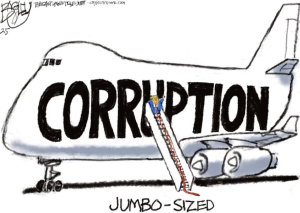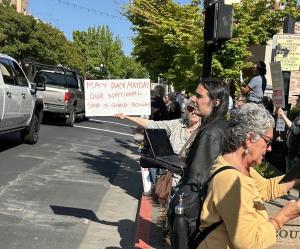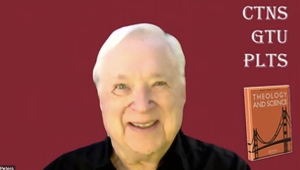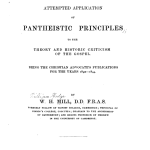 What’s a public theologian to do when challenged by corruption and cruelty without conscience? How did we fall into an empty cavern where once compassion and moral standards brimmed over? As America slogs one step after the other up the path from democracy to dictatorship, how can we change course?
What’s a public theologian to do when challenged by corruption and cruelty without conscience? How did we fall into an empty cavern where once compassion and moral standards brimmed over? As America slogs one step after the other up the path from democracy to dictatorship, how can we change course?
Corruption and Cruelty without Conscience
Without shame the family of the 47th US president flits from airport to airport making so-called ‘deals’ that pour money into phratry pockets faster than AI can count it. Despite being a clear violation of the emoluments clause in the US Constitution 9:8 prohibiting federal officials from accepting gifts, payments, or other benefits from foreign states without Congressional consent, the term ‘corruption’ is not even whispered in the White House.
Without shame the sycophants surrounding the 47th US president kidnap foreign students and Spanish speaking families, fly them first to a detention center in another state, and then deport them, in some cases to concentration prisons in El Salvador. Those arrested are denied habeas corpus. Because today’s victims are foreigners, MAGA citizens watch silently as treatment of arrestees becomes gradually more and more cruel. The prospect that such cruelty will in the future be used against domestic political adversaries of the White House seems to go unrecognized by terrified bystanders. Has moral conscience simply evaporated?

No. Outrage is raging in every state. Public protests remind us that there still are Americans who welcome the foreigner, who demand due process, and who oppose dictatorship. Conscience in the culture may be confused at the moment, but it will soon coalesce into a momentous force for redemption.
Greed is what motivates the newly instantiated hierarchy in Washington. Note how the daily spate of lies covers over the insidious plot to steal what had been federal funds for health and education and various dimensions of human wellbeing in order to give booty to the wealthiest of the wealthy through tax cuts and pay-to-play government contracts. The greed creed corrupts. Public corruption in America today exceeds even the wildest Mafia daydreams.
The Greed Creed versus Religious Conscience
What is true, good, and just implicitly draw the allegiance of our human conscience. This remains the case even for the corrupt person, because such a person covers over corruption with lies that make corruption look just. The beloved Jewish philosopher of a previous generation, Abraham Heschel, made this clear. “Justice is good not because we feel the need of it; rather, we ought to feel the need of justice because it is good” (Heschel 1952, 250). A conscience formed by reverence for justice belonged inherently in what was once American Civil Religion.

Has America lost its Civil Religious tradition which once lifted up compassion and justice and personal character as moral ideals? Has America lost its reliance on persons of virtue in the Christian and Jewish traditions who demand of government what they demand of themselves? Without persons of moral integrity, corruption and cruelty without conscience will reign unchallenged.
Even so, we must take note of one fact in history. The greed creed has no friends among the great religious traditions. One of my GTU colleagues, Dharma scholar Rita D. Sherma, reminds us that spiritual integrity shuns the greed creed.
“Amongst the diverse resources of religious worlds for such an effort are (1) an inherent critique of consumption and hyper-materialism by the sacred texts of almost all religions; (2) emphasis on community rather than self-centeredness; (3) elevation of simplicity rather than hyper-consumptive materialism; and (4) an integral relationship to nature espoused by sources as diverse as the Shinto philosophy of interrelated intricacy, Buddhist metaphysics, the theology of St. Francis of Assisi, Judaism’s principle of the Jubilee (the year at the end of seven cycles of shmita), and the human ecology of the Hindu Vedas” (Sherma, 2022, p. 22).
One takeaway from what Professor Sherma says could be this: it matters less which religion and more what virtually all religions say about the greed creed. Moral integrity in many religious traditions shuns greed for both personal virtue and communal bonding.
Conclusion: Corruption and Cruelty without Conscience
Writing in the August 7, 2020 issue of Christianity Today, Susan Codone reminds us “we can challenge the systemic social problems of racism, sexual abuse, misogyny, and domestic violence with courage—hoping for change, not retribution.” Note: change without retribution.
Those among us who miss what we are rapidly losing dare not resort to counter measures that rely on oppositional illegality, cruelty, or violence. Rather, the rule of law must be invoked, supported by the populace, and demanded of the government.
This is no time to wallow in cynicism. Through discourse clarification and worldview construction, the public theologian must lift up the attractiveness of high-minded morality, justice, and compassion. Through cultural enrichment, the public theologian can and should lift up what is possible when all persons of good will demand a cessation of corruption and cruelty in their name.
Patheos PT 3282 Corruption and Cruelty without Conscience
Patheos PT 3212 A More Compassionate America?
Substack PT 3258. Has the Rolling Coup D’etat begun?
Substack Pt 3259. Washington’s Coming Techno-Monarchy
Substack PT 3260. Plundering Social Security
Substack PT 3261. Wounded Child No Surviving Family
Substack PT 3262. DOGE Fires Holy Spirit
▓

Meet Ted Peters. For Patheos, Ted Peters posts articles and notices in the field of Public Theology. He is a pastor in the Evangelical Lutheran Church in America and emeritus professor at Pacific Lutheran Theological Seminary and the Graduate Theological Union. His single volume systematic theology, God—The World’s Future, is now in the 3rd edition. He has also authored God as Trinity plus Sin: Radical Evil in Soul and Society as well as Sin Boldly: Justifying Faith for Fragile and Broken Souls. He recently published. The Voice of Public Theology, with ATF Press. See his website: TedsTimelyTake.com and Patheos blog site, https://www.patheos.com/blogs/publictheology/ .
▓
References
Heschel, A. J. (1952). Man is Not Alone: A Philosophy of Religion. New York: Noonday Press.
Sherma, R. (2022). Sustainability Studies: Beyond the Denial of Religion and Theology as Resources. In e. Rita D. Sherma and Purushottama Bilimoria, Religion and Sustainability: Interreligious Resources, Interdisciplinary Responses (pp. 28-42). Switzerland: Springer.













